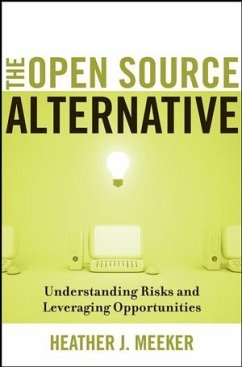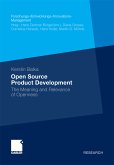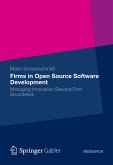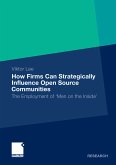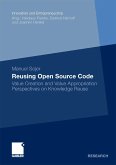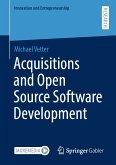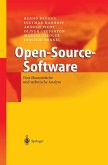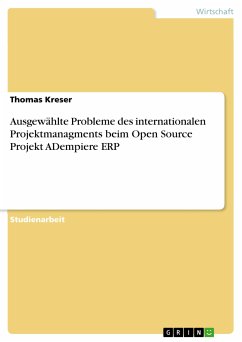Heather J. Meeker
The Open Source Alternative (eBook, PDF)
Understanding Risks and Leveraging Opportunities
28,99 €
28,99 €
inkl. MwSt.
Sofort per Download lieferbar

0 °P sammeln
28,99 €
Als Download kaufen

28,99 €
inkl. MwSt.
Sofort per Download lieferbar

0 °P sammeln
Jetzt verschenken
Alle Infos zum eBook verschenken
28,99 €
inkl. MwSt.
Sofort per Download lieferbar
Alle Infos zum eBook verschenken

0 °P sammeln
Heather J. Meeker
The Open Source Alternative (eBook, PDF)
Understanding Risks and Leveraging Opportunities
- Format: PDF
- Merkliste
- Auf die Merkliste
- Bewerten Bewerten
- Teilen
- Produkt teilen
- Produkterinnerung
- Produkterinnerung

Bitte loggen Sie sich zunächst in Ihr Kundenkonto ein oder registrieren Sie sich bei
bücher.de, um das eBook-Abo tolino select nutzen zu können.
Hier können Sie sich einloggen
Hier können Sie sich einloggen
Sie sind bereits eingeloggt. Klicken Sie auf 2. tolino select Abo, um fortzufahren.

Bitte loggen Sie sich zunächst in Ihr Kundenkonto ein oder registrieren Sie sich bei bücher.de, um das eBook-Abo tolino select nutzen zu können.
This book is a user manual for understanding and deployment of open source software licensing in business. Written for lawyers and businesspeople alike, it explains and analyzes open source licensing issues, and gives practical suggestions on how to deal with open source licensing in a business context. Including useful forms, information, and both technical and licensing background, this book will help you avoid legal pitfalls and edcuate your organization about the risks of open source.
- Geräte: PC
- mit Kopierschutz
- eBook Hilfe
- Größe: 1.39MB
Andere Kunden interessierten sich auch für
![Open Source Product Development (eBook, PDF) Open Source Product Development (eBook, PDF)]() Kerstin BalkaOpen Source Product Development (eBook, PDF)40,95 €
Kerstin BalkaOpen Source Product Development (eBook, PDF)40,95 €![Firms in Open Source Software Development (eBook, PDF) Firms in Open Source Software Development (eBook, PDF)]() Mario SchaarschmidtFirms in Open Source Software Development (eBook, PDF)40,95 €
Mario SchaarschmidtFirms in Open Source Software Development (eBook, PDF)40,95 €![How Firms Can Strategically Influence Open Source Communities (eBook, PDF) How Firms Can Strategically Influence Open Source Communities (eBook, PDF)]() Viktor LeeHow Firms Can Strategically Influence Open Source Communities (eBook, PDF)40,95 €
Viktor LeeHow Firms Can Strategically Influence Open Source Communities (eBook, PDF)40,95 €![Reusing Open Source Code (eBook, PDF) Reusing Open Source Code (eBook, PDF)]() Manuel SojerReusing Open Source Code (eBook, PDF)40,95 €
Manuel SojerReusing Open Source Code (eBook, PDF)40,95 €![Acquisitions and Open Source Software Development (eBook, PDF) Acquisitions and Open Source Software Development (eBook, PDF)]() Michael VetterAcquisitions and Open Source Software Development (eBook, PDF)40,95 €
Michael VetterAcquisitions and Open Source Software Development (eBook, PDF)40,95 €![Open-Source-Software (eBook, PDF) Open-Source-Software (eBook, PDF)]() Bernd BrüggeOpen-Source-Software (eBook, PDF)49,44 €
Bernd BrüggeOpen-Source-Software (eBook, PDF)49,44 €![Ausgewählte Probleme des internationalen Projektmanagments beim Open Source Projekt ADempiere ERP (eBook, PDF) Ausgewählte Probleme des internationalen Projektmanagments beim Open Source Projekt ADempiere ERP (eBook, PDF)]() Thomas KreserAusgewählte Probleme des internationalen Projektmanagments beim Open Source Projekt ADempiere ERP (eBook, PDF)16,99 €
Thomas KreserAusgewählte Probleme des internationalen Projektmanagments beim Open Source Projekt ADempiere ERP (eBook, PDF)16,99 €-
-
-
This book is a user manual for understanding and deployment of open source software licensing in business. Written for lawyers and businesspeople alike, it explains and analyzes open source licensing issues, and gives practical suggestions on how to deal with open source licensing in a business context. Including useful forms, information, and both technical and licensing background, this book will help you avoid legal pitfalls and edcuate your organization about the risks of open source.
Hinweis: Dieser Artikel kann nur an eine deutsche Lieferadresse ausgeliefert werden.
Dieser Download kann aus rechtlichen Gründen nur mit Rechnungsadresse in A, B, BG, CY, CZ, D, DK, EW, E, FIN, F, GR, HR, H, IRL, I, LT, L, LR, M, NL, PL, P, R, S, SLO, SK ausgeliefert werden.
Hinweis: Dieser Artikel kann nur an eine deutsche Lieferadresse ausgeliefert werden.
Produktdetails
- Produktdetails
- Verlag: Wiley-IEEE Press
- Seitenzahl: 304
- Erscheinungstermin: 19. Februar 2008
- Englisch
- ISBN-13: 9780470255810
- Artikelnr.: 37291263
- Verlag: Wiley-IEEE Press
- Seitenzahl: 304
- Erscheinungstermin: 19. Februar 2008
- Englisch
- ISBN-13: 9780470255810
- Artikelnr.: 37291263
- Herstellerkennzeichnung Die Herstellerinformationen sind derzeit nicht verfügbar.
Heather J. Meeker is a shareholder at Greenberg Traurig, LLP, one of the largest law firms in the United States. Heather has provided open source counseling to clients ranging from technology startups using open source in product development, to public technology companies conducting open source code releases, to venture capitalists assessing new business models in the software industry. She also serves as an adjunct professor at the U.C. Berkeley School of Law, is a member of the American Law Institute, and in 2005, was selected by the Daily Journal as one of the top thirty intellectual property lawyers in California.
Preface ix
Part one Leveraging opportunities 1
Chapter 1 Introduction: How UNIX Gave Birth to Linux, and a New Software
Paradigm 3
In the Beginning Was the Word, and the Word Was UNIX 3
Along Comes Linux 6
Now, What is Open Source? 7
And This is Just the Beginning 9
Chapter 2 Free Software and Open Source 11
Viruses and Freedoms 11
Philosophy of Free Software 13
Open Source Initiative 18
Mozilla Foundation 18
Linus Torvalds 19
Definitions: Free Software and Open Source 21
What's in a Name? The Viral and the Nonviral 22
Open Source Development Model 25
Chapter 3 Common Open Source Licenses and Their Structure 27
Direct Licensing 29
GPL 29
GPL + Exception (or Special Exception) 39
GPL + FLOSS Exception 40
LGPL 40
Corporate Hereditary Software Licenses 41
Other Hereditary Software Licenses 43
Permissive Licenses 43
Apache 1.0 46
Apache 1.1 46
Apache 2.0 46
Artistic License 46
Miscellaneous Licenses 47
Non-Software Licenses 49
Chapter 4 Due Diligence, License Proliferation, and Compatibility 53
What is the Problem with Combining Software? 53
What is Due Diligence? 54
License Conditions and Diligence Problems 57
License Compatibility 59
Choices in an Incompatible World 62
An Embarrassment of Riches? 66
Reusability 69
Chapter 5 Audits and Compliance Initiatives 71
Provenance and Objective Checking 72
Applying Policy and Legal Review 74
Some Nuts and Bolts 76
Chapter 6 Notice Requirements 83
Chapter 7 Patents and Open Source 89
Patent Debate 89
Patent Portfolio Management 98
Chapter 8 Trademarks and Open Source 109
Trademark Law and Open Source Licensing 109
Trademarks in the Open Source World 111
AT&T UNIX Battle 112
Chapter 9 Open Source and Open Standards 115
Chapter 10 Developing a Corporate Open Source Policy 119
Appendix 10A Open Source Corporate Policy 123
Chapter 11 Open Source Code Releases 135
Choosing a License 136
Effect on Patent Portfolio 139
Effect on Trademarks 140
Open Source Business Models 142
Dual Licensing 143
"Ur-Licensor" and Open Source Decision Models 146
Contribution Agreements 146
Reissuing Code 150
Corporate Organization 150
Appendix 11A Open Source Trademark Policy 153
Part two Understanding risks 159
Chapter 12 Technical Background: Operating System Kernels, User Space, and
Elements of Programming 161
What is the difference Between an Application and an Operating System? 163
What is an Operating System Kernel? 164
What is an Application? 165
Dynamic and Static Linking, and Inline Code 166
Header Files 169
Monoliths and Loadable Kernel Modules 170
Chapter 13 Enforcement of Open Source Licenses 171
Past Enforcement 171
Enforcement Obstacles 176
Lack of Track Record: GPL Has Never Been Tested in Court 176
Waiver/Estoppel: Occasional and Selective Enforcement of GPL Means it is
Unenforceable 177
Formation: GPL is Not Validly Accepted by Licensees 177
GPL Constitutes Copyright Misuse 178
Joint Work Arguments 179
Standing and Joinder Arguments 180
Chapter 14 The Border Dispute of GPL2 183
Defining the Border Dispute 183
What the GPL Says 184
Rules of Contract Construction 186
Applying the Four Corners Rule to GPL2 188
Applying the Rules of Contract Construction of GPL2 190
Trade Usage and Other Extrinsic Evidence 191
Derivative Works Question 192
The Facts 195
Legal Rules 196
Analyzing the Case of Two Works 200
Is the Result One or Two Works? 205
Policy Arguments 206
Non-U.S. Law Interpretations 207
Approach of Legal Realism 208
Outside the Four Corners 209
Loadable Kernel Modules 212
The Hardest Cases 216
LGPL Compliance 217
Chapter 15 License or Contract? 223
Contract Formation 223
Arguments Supporting Formation 225
Implications of Absence of Contract Formation 226
Incentives for Formation Arguments 229
Chapter 16 Defining Distribution 233
Chapter 17 Open Source in Mergers and Acquisitions and Other Transactions
237
Open Source in Licensing and Commercial Transactions 241
Development Agreements 242
Chapter 18 GPL Version 3.0 245
What is the Effect of the Release of GPL3? 245
Adoption of GPL3 247
Politics and Context 248
"Derivative Works" Problem 251
"Propagation" and "Conveying" 252
Patents 252
Digital Millennium Copyright Act Provisions 255
"Java Problem" 257
Disabling and Obfuscation 257
ASP Problem 258
License Compatibility 259
Chapter 19 LGPL Version 3.0 261
New Approach for LGPL 261
Adoption of LGPL3 261
Politics and Context 262
Definitions 262
Compliance 262
Drawbacks 264
Appendix A Open Source Development Agreement 265
Glossary 277
Index 283
Part one Leveraging opportunities 1
Chapter 1 Introduction: How UNIX Gave Birth to Linux, and a New Software
Paradigm 3
In the Beginning Was the Word, and the Word Was UNIX 3
Along Comes Linux 6
Now, What is Open Source? 7
And This is Just the Beginning 9
Chapter 2 Free Software and Open Source 11
Viruses and Freedoms 11
Philosophy of Free Software 13
Open Source Initiative 18
Mozilla Foundation 18
Linus Torvalds 19
Definitions: Free Software and Open Source 21
What's in a Name? The Viral and the Nonviral 22
Open Source Development Model 25
Chapter 3 Common Open Source Licenses and Their Structure 27
Direct Licensing 29
GPL 29
GPL + Exception (or Special Exception) 39
GPL + FLOSS Exception 40
LGPL 40
Corporate Hereditary Software Licenses 41
Other Hereditary Software Licenses 43
Permissive Licenses 43
Apache 1.0 46
Apache 1.1 46
Apache 2.0 46
Artistic License 46
Miscellaneous Licenses 47
Non-Software Licenses 49
Chapter 4 Due Diligence, License Proliferation, and Compatibility 53
What is the Problem with Combining Software? 53
What is Due Diligence? 54
License Conditions and Diligence Problems 57
License Compatibility 59
Choices in an Incompatible World 62
An Embarrassment of Riches? 66
Reusability 69
Chapter 5 Audits and Compliance Initiatives 71
Provenance and Objective Checking 72
Applying Policy and Legal Review 74
Some Nuts and Bolts 76
Chapter 6 Notice Requirements 83
Chapter 7 Patents and Open Source 89
Patent Debate 89
Patent Portfolio Management 98
Chapter 8 Trademarks and Open Source 109
Trademark Law and Open Source Licensing 109
Trademarks in the Open Source World 111
AT&T UNIX Battle 112
Chapter 9 Open Source and Open Standards 115
Chapter 10 Developing a Corporate Open Source Policy 119
Appendix 10A Open Source Corporate Policy 123
Chapter 11 Open Source Code Releases 135
Choosing a License 136
Effect on Patent Portfolio 139
Effect on Trademarks 140
Open Source Business Models 142
Dual Licensing 143
"Ur-Licensor" and Open Source Decision Models 146
Contribution Agreements 146
Reissuing Code 150
Corporate Organization 150
Appendix 11A Open Source Trademark Policy 153
Part two Understanding risks 159
Chapter 12 Technical Background: Operating System Kernels, User Space, and
Elements of Programming 161
What is the difference Between an Application and an Operating System? 163
What is an Operating System Kernel? 164
What is an Application? 165
Dynamic and Static Linking, and Inline Code 166
Header Files 169
Monoliths and Loadable Kernel Modules 170
Chapter 13 Enforcement of Open Source Licenses 171
Past Enforcement 171
Enforcement Obstacles 176
Lack of Track Record: GPL Has Never Been Tested in Court 176
Waiver/Estoppel: Occasional and Selective Enforcement of GPL Means it is
Unenforceable 177
Formation: GPL is Not Validly Accepted by Licensees 177
GPL Constitutes Copyright Misuse 178
Joint Work Arguments 179
Standing and Joinder Arguments 180
Chapter 14 The Border Dispute of GPL2 183
Defining the Border Dispute 183
What the GPL Says 184
Rules of Contract Construction 186
Applying the Four Corners Rule to GPL2 188
Applying the Rules of Contract Construction of GPL2 190
Trade Usage and Other Extrinsic Evidence 191
Derivative Works Question 192
The Facts 195
Legal Rules 196
Analyzing the Case of Two Works 200
Is the Result One or Two Works? 205
Policy Arguments 206
Non-U.S. Law Interpretations 207
Approach of Legal Realism 208
Outside the Four Corners 209
Loadable Kernel Modules 212
The Hardest Cases 216
LGPL Compliance 217
Chapter 15 License or Contract? 223
Contract Formation 223
Arguments Supporting Formation 225
Implications of Absence of Contract Formation 226
Incentives for Formation Arguments 229
Chapter 16 Defining Distribution 233
Chapter 17 Open Source in Mergers and Acquisitions and Other Transactions
237
Open Source in Licensing and Commercial Transactions 241
Development Agreements 242
Chapter 18 GPL Version 3.0 245
What is the Effect of the Release of GPL3? 245
Adoption of GPL3 247
Politics and Context 248
"Derivative Works" Problem 251
"Propagation" and "Conveying" 252
Patents 252
Digital Millennium Copyright Act Provisions 255
"Java Problem" 257
Disabling and Obfuscation 257
ASP Problem 258
License Compatibility 259
Chapter 19 LGPL Version 3.0 261
New Approach for LGPL 261
Adoption of LGPL3 261
Politics and Context 262
Definitions 262
Compliance 262
Drawbacks 264
Appendix A Open Source Development Agreement 265
Glossary 277
Index 283
Preface ix
Part one Leveraging opportunities 1
Chapter 1 Introduction: How UNIX Gave Birth to Linux, and a New Software
Paradigm 3
In the Beginning Was the Word, and the Word Was UNIX 3
Along Comes Linux 6
Now, What is Open Source? 7
And This is Just the Beginning 9
Chapter 2 Free Software and Open Source 11
Viruses and Freedoms 11
Philosophy of Free Software 13
Open Source Initiative 18
Mozilla Foundation 18
Linus Torvalds 19
Definitions: Free Software and Open Source 21
What's in a Name? The Viral and the Nonviral 22
Open Source Development Model 25
Chapter 3 Common Open Source Licenses and Their Structure 27
Direct Licensing 29
GPL 29
GPL + Exception (or Special Exception) 39
GPL + FLOSS Exception 40
LGPL 40
Corporate Hereditary Software Licenses 41
Other Hereditary Software Licenses 43
Permissive Licenses 43
Apache 1.0 46
Apache 1.1 46
Apache 2.0 46
Artistic License 46
Miscellaneous Licenses 47
Non-Software Licenses 49
Chapter 4 Due Diligence, License Proliferation, and Compatibility 53
What is the Problem with Combining Software? 53
What is Due Diligence? 54
License Conditions and Diligence Problems 57
License Compatibility 59
Choices in an Incompatible World 62
An Embarrassment of Riches? 66
Reusability 69
Chapter 5 Audits and Compliance Initiatives 71
Provenance and Objective Checking 72
Applying Policy and Legal Review 74
Some Nuts and Bolts 76
Chapter 6 Notice Requirements 83
Chapter 7 Patents and Open Source 89
Patent Debate 89
Patent Portfolio Management 98
Chapter 8 Trademarks and Open Source 109
Trademark Law and Open Source Licensing 109
Trademarks in the Open Source World 111
AT&T UNIX Battle 112
Chapter 9 Open Source and Open Standards 115
Chapter 10 Developing a Corporate Open Source Policy 119
Appendix 10A Open Source Corporate Policy 123
Chapter 11 Open Source Code Releases 135
Choosing a License 136
Effect on Patent Portfolio 139
Effect on Trademarks 140
Open Source Business Models 142
Dual Licensing 143
"Ur-Licensor" and Open Source Decision Models 146
Contribution Agreements 146
Reissuing Code 150
Corporate Organization 150
Appendix 11A Open Source Trademark Policy 153
Part two Understanding risks 159
Chapter 12 Technical Background: Operating System Kernels, User Space, and
Elements of Programming 161
What is the difference Between an Application and an Operating System? 163
What is an Operating System Kernel? 164
What is an Application? 165
Dynamic and Static Linking, and Inline Code 166
Header Files 169
Monoliths and Loadable Kernel Modules 170
Chapter 13 Enforcement of Open Source Licenses 171
Past Enforcement 171
Enforcement Obstacles 176
Lack of Track Record: GPL Has Never Been Tested in Court 176
Waiver/Estoppel: Occasional and Selective Enforcement of GPL Means it is
Unenforceable 177
Formation: GPL is Not Validly Accepted by Licensees 177
GPL Constitutes Copyright Misuse 178
Joint Work Arguments 179
Standing and Joinder Arguments 180
Chapter 14 The Border Dispute of GPL2 183
Defining the Border Dispute 183
What the GPL Says 184
Rules of Contract Construction 186
Applying the Four Corners Rule to GPL2 188
Applying the Rules of Contract Construction of GPL2 190
Trade Usage and Other Extrinsic Evidence 191
Derivative Works Question 192
The Facts 195
Legal Rules 196
Analyzing the Case of Two Works 200
Is the Result One or Two Works? 205
Policy Arguments 206
Non-U.S. Law Interpretations 207
Approach of Legal Realism 208
Outside the Four Corners 209
Loadable Kernel Modules 212
The Hardest Cases 216
LGPL Compliance 217
Chapter 15 License or Contract? 223
Contract Formation 223
Arguments Supporting Formation 225
Implications of Absence of Contract Formation 226
Incentives for Formation Arguments 229
Chapter 16 Defining Distribution 233
Chapter 17 Open Source in Mergers and Acquisitions and Other Transactions
237
Open Source in Licensing and Commercial Transactions 241
Development Agreements 242
Chapter 18 GPL Version 3.0 245
What is the Effect of the Release of GPL3? 245
Adoption of GPL3 247
Politics and Context 248
"Derivative Works" Problem 251
"Propagation" and "Conveying" 252
Patents 252
Digital Millennium Copyright Act Provisions 255
"Java Problem" 257
Disabling and Obfuscation 257
ASP Problem 258
License Compatibility 259
Chapter 19 LGPL Version 3.0 261
New Approach for LGPL 261
Adoption of LGPL3 261
Politics and Context 262
Definitions 262
Compliance 262
Drawbacks 264
Appendix A Open Source Development Agreement 265
Glossary 277
Index 283
Part one Leveraging opportunities 1
Chapter 1 Introduction: How UNIX Gave Birth to Linux, and a New Software
Paradigm 3
In the Beginning Was the Word, and the Word Was UNIX 3
Along Comes Linux 6
Now, What is Open Source? 7
And This is Just the Beginning 9
Chapter 2 Free Software and Open Source 11
Viruses and Freedoms 11
Philosophy of Free Software 13
Open Source Initiative 18
Mozilla Foundation 18
Linus Torvalds 19
Definitions: Free Software and Open Source 21
What's in a Name? The Viral and the Nonviral 22
Open Source Development Model 25
Chapter 3 Common Open Source Licenses and Their Structure 27
Direct Licensing 29
GPL 29
GPL + Exception (or Special Exception) 39
GPL + FLOSS Exception 40
LGPL 40
Corporate Hereditary Software Licenses 41
Other Hereditary Software Licenses 43
Permissive Licenses 43
Apache 1.0 46
Apache 1.1 46
Apache 2.0 46
Artistic License 46
Miscellaneous Licenses 47
Non-Software Licenses 49
Chapter 4 Due Diligence, License Proliferation, and Compatibility 53
What is the Problem with Combining Software? 53
What is Due Diligence? 54
License Conditions and Diligence Problems 57
License Compatibility 59
Choices in an Incompatible World 62
An Embarrassment of Riches? 66
Reusability 69
Chapter 5 Audits and Compliance Initiatives 71
Provenance and Objective Checking 72
Applying Policy and Legal Review 74
Some Nuts and Bolts 76
Chapter 6 Notice Requirements 83
Chapter 7 Patents and Open Source 89
Patent Debate 89
Patent Portfolio Management 98
Chapter 8 Trademarks and Open Source 109
Trademark Law and Open Source Licensing 109
Trademarks in the Open Source World 111
AT&T UNIX Battle 112
Chapter 9 Open Source and Open Standards 115
Chapter 10 Developing a Corporate Open Source Policy 119
Appendix 10A Open Source Corporate Policy 123
Chapter 11 Open Source Code Releases 135
Choosing a License 136
Effect on Patent Portfolio 139
Effect on Trademarks 140
Open Source Business Models 142
Dual Licensing 143
"Ur-Licensor" and Open Source Decision Models 146
Contribution Agreements 146
Reissuing Code 150
Corporate Organization 150
Appendix 11A Open Source Trademark Policy 153
Part two Understanding risks 159
Chapter 12 Technical Background: Operating System Kernels, User Space, and
Elements of Programming 161
What is the difference Between an Application and an Operating System? 163
What is an Operating System Kernel? 164
What is an Application? 165
Dynamic and Static Linking, and Inline Code 166
Header Files 169
Monoliths and Loadable Kernel Modules 170
Chapter 13 Enforcement of Open Source Licenses 171
Past Enforcement 171
Enforcement Obstacles 176
Lack of Track Record: GPL Has Never Been Tested in Court 176
Waiver/Estoppel: Occasional and Selective Enforcement of GPL Means it is
Unenforceable 177
Formation: GPL is Not Validly Accepted by Licensees 177
GPL Constitutes Copyright Misuse 178
Joint Work Arguments 179
Standing and Joinder Arguments 180
Chapter 14 The Border Dispute of GPL2 183
Defining the Border Dispute 183
What the GPL Says 184
Rules of Contract Construction 186
Applying the Four Corners Rule to GPL2 188
Applying the Rules of Contract Construction of GPL2 190
Trade Usage and Other Extrinsic Evidence 191
Derivative Works Question 192
The Facts 195
Legal Rules 196
Analyzing the Case of Two Works 200
Is the Result One or Two Works? 205
Policy Arguments 206
Non-U.S. Law Interpretations 207
Approach of Legal Realism 208
Outside the Four Corners 209
Loadable Kernel Modules 212
The Hardest Cases 216
LGPL Compliance 217
Chapter 15 License or Contract? 223
Contract Formation 223
Arguments Supporting Formation 225
Implications of Absence of Contract Formation 226
Incentives for Formation Arguments 229
Chapter 16 Defining Distribution 233
Chapter 17 Open Source in Mergers and Acquisitions and Other Transactions
237
Open Source in Licensing and Commercial Transactions 241
Development Agreements 242
Chapter 18 GPL Version 3.0 245
What is the Effect of the Release of GPL3? 245
Adoption of GPL3 247
Politics and Context 248
"Derivative Works" Problem 251
"Propagation" and "Conveying" 252
Patents 252
Digital Millennium Copyright Act Provisions 255
"Java Problem" 257
Disabling and Obfuscation 257
ASP Problem 258
License Compatibility 259
Chapter 19 LGPL Version 3.0 261
New Approach for LGPL 261
Adoption of LGPL3 261
Politics and Context 262
Definitions 262
Compliance 262
Drawbacks 264
Appendix A Open Source Development Agreement 265
Glossary 277
Index 283
